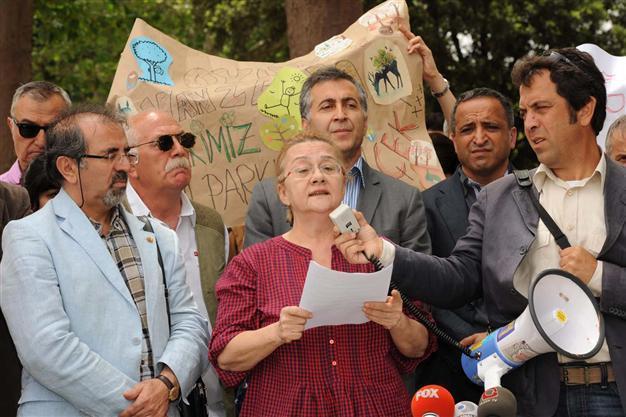Istanbul prosecutors prepare new indictment for Gezi Park protests
ISTANBUL - Hürriyet Daily News

In a previous indictment, the Taksim Solidarity Platform's forthright spokeperson, Mücella Yapıcı, was charged along with five other platform members with leading a criminal organization. DHA photo
Istanbul prosecutors have refiled an indictment over last summer’s Gezi protests after a court ordered them to eliminate shortcomings in a previous version of the document, charging five people from Taksim Solidarity with leading a criminal organization.
Ali Çerkezoğlu, Mücella Yapıcı, Beyza Metin, Ender İmrek and Haluk Ağabeyoğlu, all prominent members of Taksim Solidarity, which led last year’s calls to prevent the destruction of Taksim Gezi Park and its replacement with a mall, were charged with leading a criminal organization and violations on the law on rallies. Prosecutor Mesut Erdinç Bayhan has demanded the five each be sentenced to between three and 13.5 years in prison.
Yapıcı, a leading city planner, reacted to the refiled indictment with sarcasm.
“Great news! We’ve begun a co-leadership system [based on gender equality] at ‘our criminal organization.’ We’ve already fulfilled the 40 percent quota [for women],” she tweeted.
Twenty-one other suspects in the case face charges of violating the law on rallies.
The five, as well as other members of Taksim Solidarity, were detained July 8, 2013, during a demonstration at the putative reopening of Gezi Park after police sealed it off for three weeks following a brutal attack on peaceful campers. Istanbul Gov. Hüseyin Avni Mutlu announced the reopening of the park for July 8, prompting Taksim Solidarity to call on the public to attend the park’s reopening.
Frightened by the prospect of mass solidarity, however, Mutlu quickly reordered the closure of the park. The refiled indictment accused Taksim Solidarity of “provocations” in calling on people to come to the park for the reopening.
In the new indictment, Bayhan said equipment to protect against police attacks such as helmets, hardhats and goggles were not, of themselves, illicit materials, but added that they could be used as evidence that the suspects had participated in the protests, which resulted in the deaths of seven demonstrators last summer.
Last month, a court rejected an initial indictment in the case, saying it was not clear under which laws the suspects had founded an organization to commit crimes. The indictment should explain how the suspects founded and controlled an organization to commit which crimes under which law, so as to permit them to defend themselves.
Prosecutors demanded that suspects be punished on charges of resisting a public official, but the court said there must be evidence of physical coercion or threats for the 26 to stand trial for such an alleged crime. The indictment did not identify which public officials were allegedly subjected to violence or threats, although it must include officers’ names as complainants, the court added.
